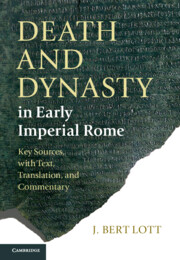5 - Princes’ biographies
Published online by Cambridge University Press: 05 November 2012
Summary
The most detailed biography for all our princes is Hurlet 1997, which collects prior bibliography as well. There is no good book-length treatment of Gaius and Lucius, beyond the limited scope of Pollini 1987. For Germanicus, Gallotta 1987 is important. Standard dictionary and encyclopedia articles can provide overviews in English.
Gaius and Lucius Caesar
Gaius and Lucius Caesar were the first-born sons of M. Agrippa and Augustus’ only daughter Julia. The boys were the natural grandsons of Augustus, but when Lucius was born in 17 BCE (three years after Gaius was born in 20 BCE) Augustus adopted them. Raised at Rome the boys were quickly given a place of public prominence, integrated into the composition of the imperial family, and linked to the mythic revivals that characterized the new age. In 13 BCE six-year-old Gaius led the patrician youth in Augustus’ revival of the lusus Troiae, the Trojan games, an ancient equestrian faux combat associated by Vergil (Aen. 5.548–603) with the founding of the city (Dio 54.26; see Freyburger-Galland 1997). The boys are probably the two youths famously found walking with the imperial family in the reliefs on the Ara Pacis (see Hurlet 1997: 114–115 with bibliography in n. 185; Rose 1990 has revived an older view that the figures are foreign princes). In 8 BCE Gaius accompanied Augustus and his stepbrother Tiberius on a trip to Gaul and the Rhine frontier where he was presented to the legions and a donation (congiarium) was made to the soldiers in his name (Dio 55.6). The visit is commemorated on the distributed coins themselves (RIC 12 Augustus 198; see Pollini 1985). Eventually, the growing popularity and prominence of Gaius in particular led to conflict with the future emperor Tiberius, Augustus’ son-in-law, who famously retired to Rhodes in 6 BCE on the eve of Gaius’ reaching adulthood (Dio 55.9; see Levick 1971).
- Type
- Chapter
- Information
- Death and Dynasty in Early Imperial RomeKey Sources, with Text, Translation, and Commentary, pp. 339 - 347Publisher: Cambridge University PressPrint publication year: 2012



